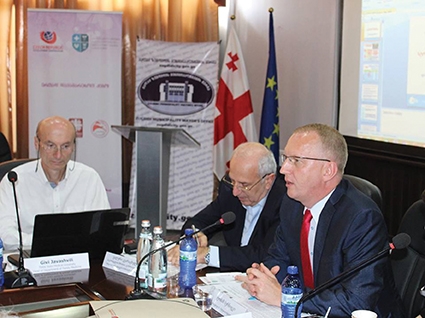Cancer is Not a Death Sentence!
Hopeful as this title may seem, there’s still one “if” – if the cancer is discovered at the early stage. At a glance, this is simple enough: in order to avoid the worst possible outcome of this disease, it needs to be detected as fast as possible, which necessitates regular health check-ups. Even if we think ourselves healthy, we still need to go to the doctor and undergo screening – a worldwide method Which plays crucial role in early detection and prevention of cancer. Screening isn’t new to Georgia, but as with many other things, our country’s reality and consciousness are able to find a great deal of arguments against making use of it.
The State program on breast, cervical, colon and prostate cancer has beenimplemented since2008 and is free for the target age groups..
Since the launch of the program, the early pathology detection rate has tripled. This does not mean that the percentage of cancer patients has grown – on the contrary, the increased availability of screening has contributed to early prevention and many lives saved as a result. Despite this, a large part of the Georgian population remains vary of the method. For example, only 8 percent of women are involved in the cervical cancer screening program – a miniscule number when compared to the same statistic in France (72 percent), the Netherlands (76 percent), Czech Republic (60 percent) or Poland (47 percent).
We asked RemaGhvamichava, head of the National Cancer Screening Center, about the reluctance of Georgian women to undergo screening:
“Awareness plays the biggest role in this. Awareness and education. Up to now only women who’d heard about screening would visit the place; now, however, we’ll be sending them letters and text messages invitingthem to come and get involved,” he said.
Early detection and prevention measures of cancer is an important ofthe primary of healthcare worker’s job – rural and family doctors are tasked with providing their patients theinformation regarding cancer prevention and early detection . This is especially vital in the regions where the rural doctor and nurse are the first links to the medical world, and it is their competence and qualifications that determine whether or not a rural woman who is busy all day long will go and get screened, especially if she doesn’t show any obvious symptom.
“The people have yet to realize the necessity of visiting a screening center even while healthy, and to act on it,” says IosebAbesadze, head of the CancerPrevention Center.
NGO Czech Republic, CancerPrevention Center, and medical-psychological center Tanadgoma,have been implementing joint project already for three years the purpose of which is to raise awareness population and strengthen primary healthcare level operatives regarding cancer prevention and early detection. Czech expertise, experience and professionalism have been a very help in this regard – according to , the project trainer oncologist LubomirSkopal, the current situation in Georgia reminds him of what was happening in the Czech Republic a few years ago. However, significant efforts aimed at awareness-raising and education have yielded impressive results.
“The project is based on a holistic approach which implies strengthening the role of primary health workerin cancer control strategy.Also, raising awareness in the population about importance of cancer prevention and early detection in order to overcome the stigma associated with cancer. The project has been financially supported all these years by the Czech Republic Development Agency,” said Tamar Kurtanidze, project manager of Caritas Czech Republic, at a large-scale conference held in Zugdidi dedicated to raising awarenssono cancer prevention and early detection.
It gets worse – challenges faced by the regions as described above are most acutely felt in the Samegrelo-UpperSvaneti region, as there is no screening center there and the local denizens need to go to Kutaisi or Adjara to get involved in the program. This is theory, while in practice the number of rural denizens who actually do that is very small. As a rule, healthy people do not have much contact with doctors and are even more unlikely to cover a large distance in order to undergo a preventive procedure.
Reasons for this have already been discussed – lack of awareness and education, everyday business and geographical inaccessibility of the program. It can be freely said that the lack of a screening center in Zugdidi negatively affects the opportunity of local denizens to make use of the program and save themselves from a potentially life-threatening condition. The good news is that such a center is about to be opened, again thanks to efforts of Caritas Czech Republic in Georgia and the Czech Republic Development Agency. It will be equipped with the most modern technology available in Georgia, to boot.
“It will be the most modern screening center in Georgia at the moment, and I promise that it will save thousands of lives,” says Ghvamichava.
Stay healthy!
VazhaTavberidze












